Restaurant Accountant Resume Examples

Jul 18, 2024
|
12 min read
Craft an impressive restaurant accountant resume: Tips and tricks for balancing your skills and experience.
Rated by 348 people
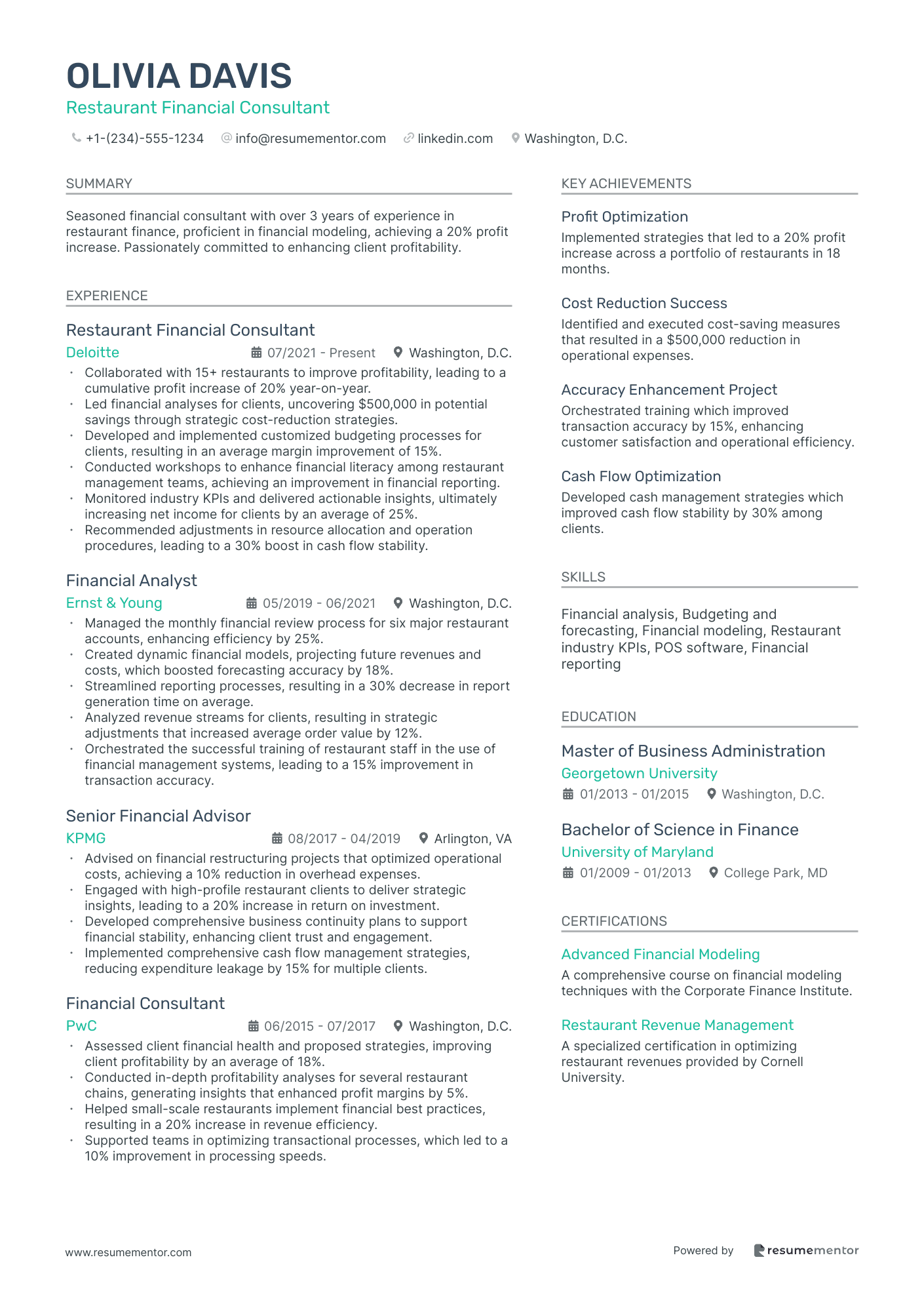
Restaurant Financial Consultant
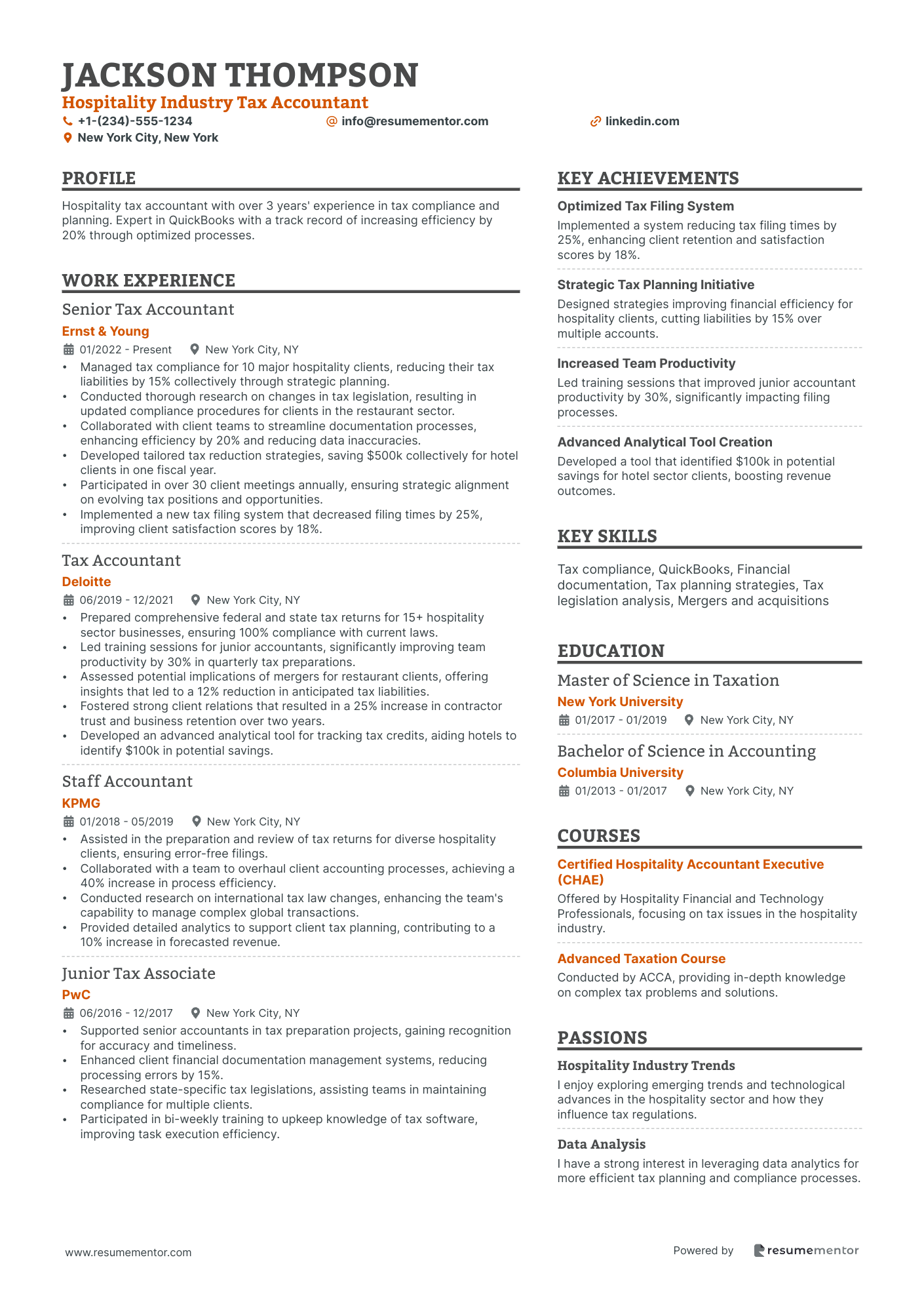
Hospitality Industry Tax Accountant
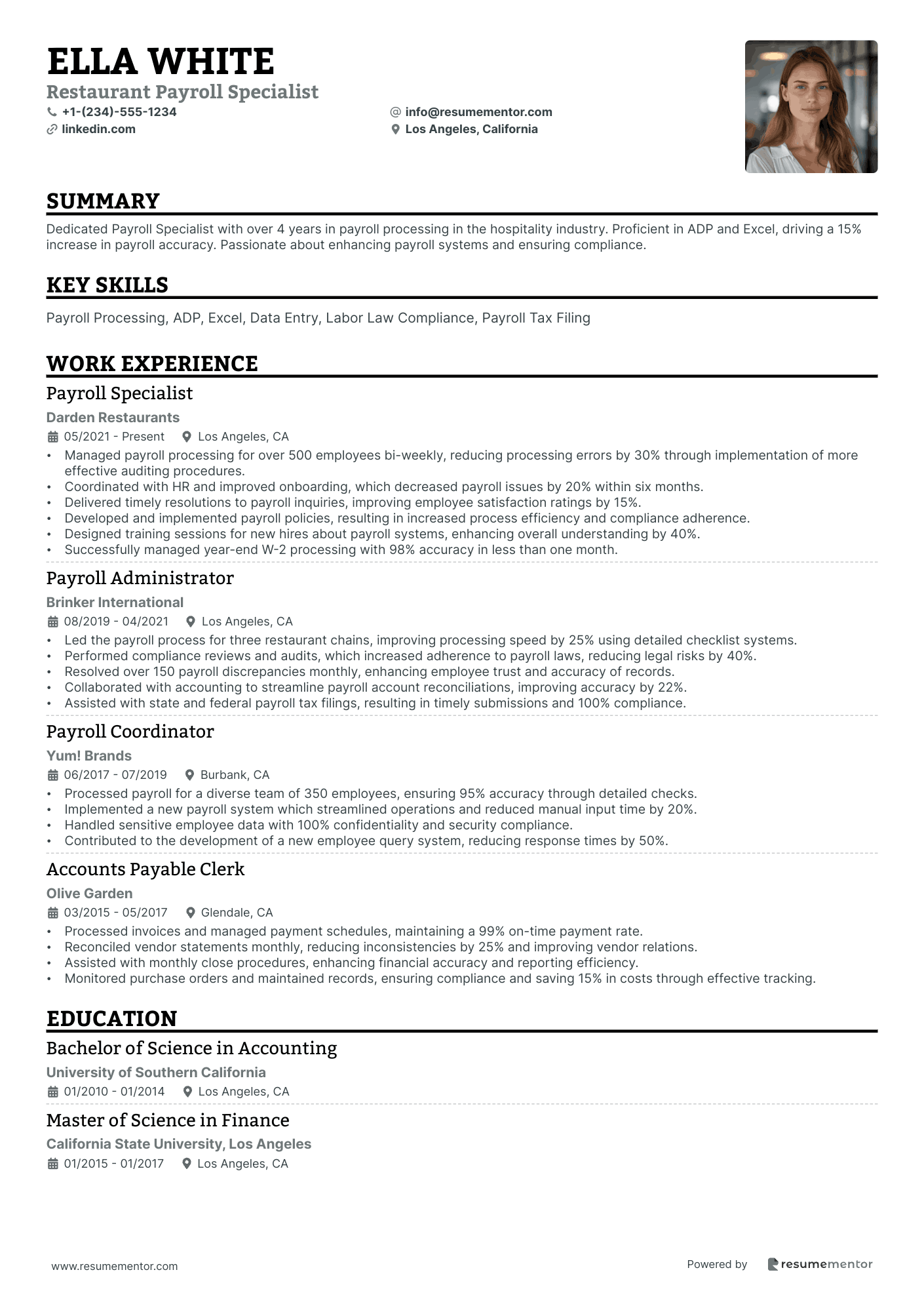
Restaurant Payroll Specialist
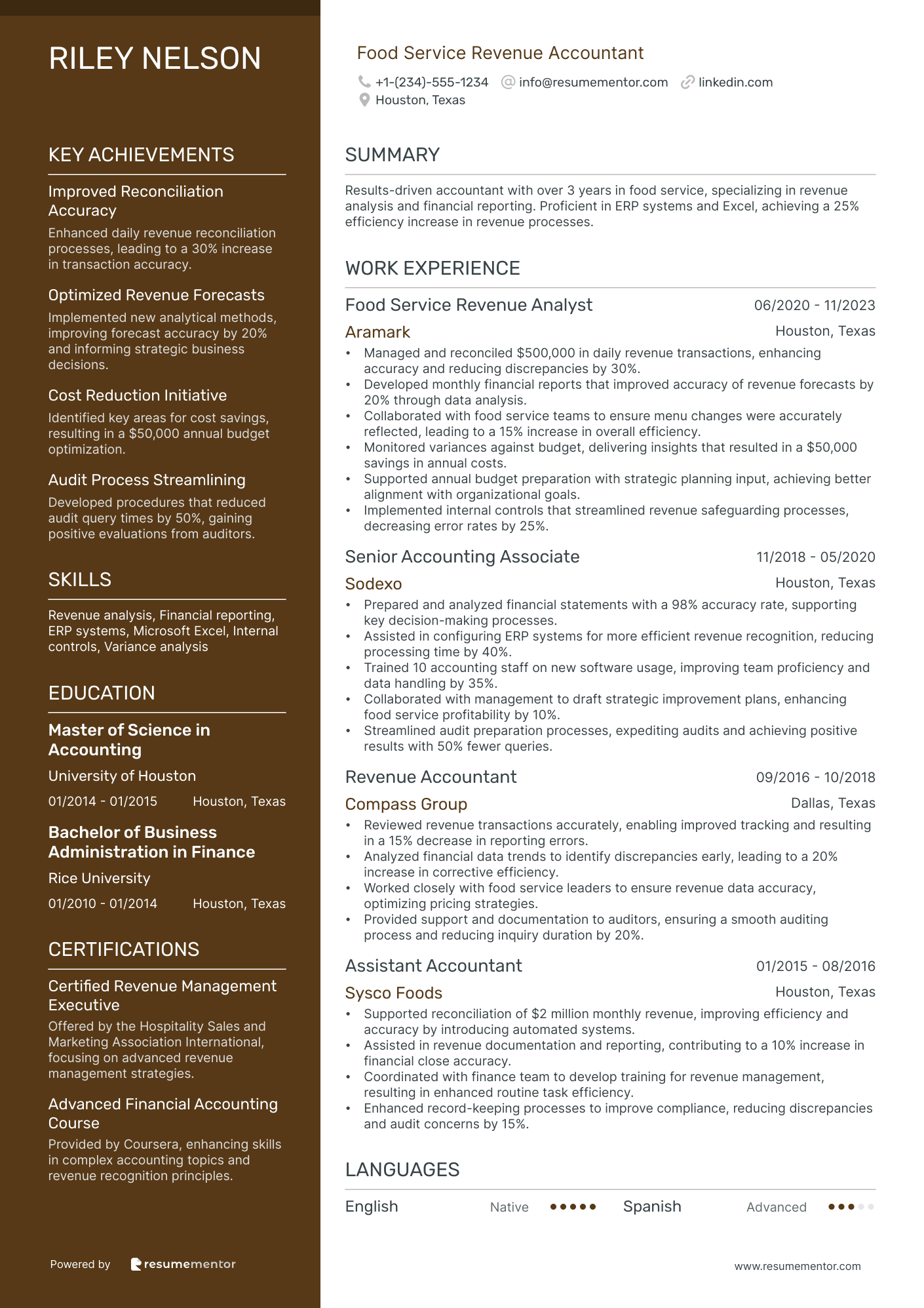
Food Service Revenue Accountant
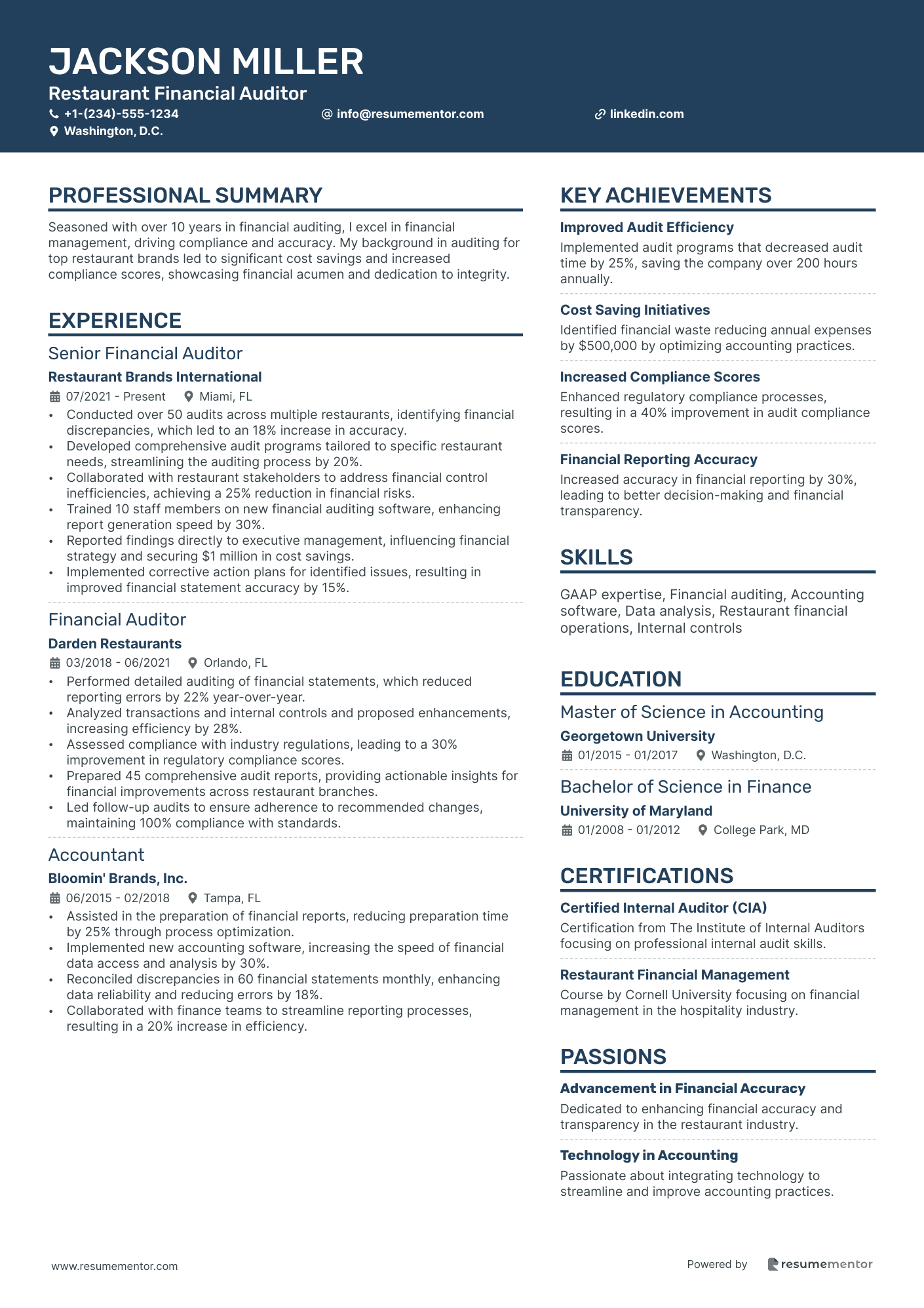
Restaurant Financial Auditor
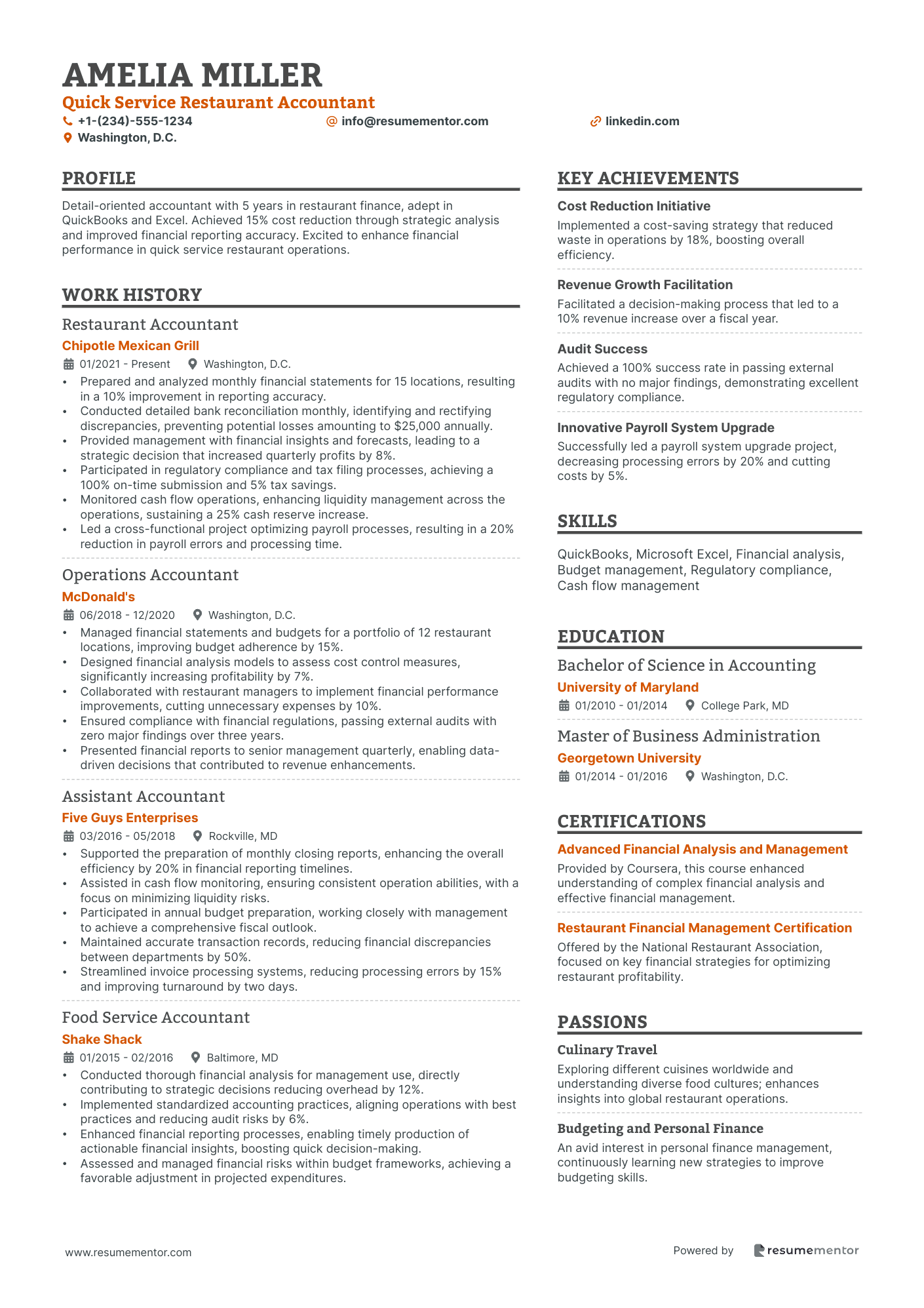
Quick Service Restaurant Accountant
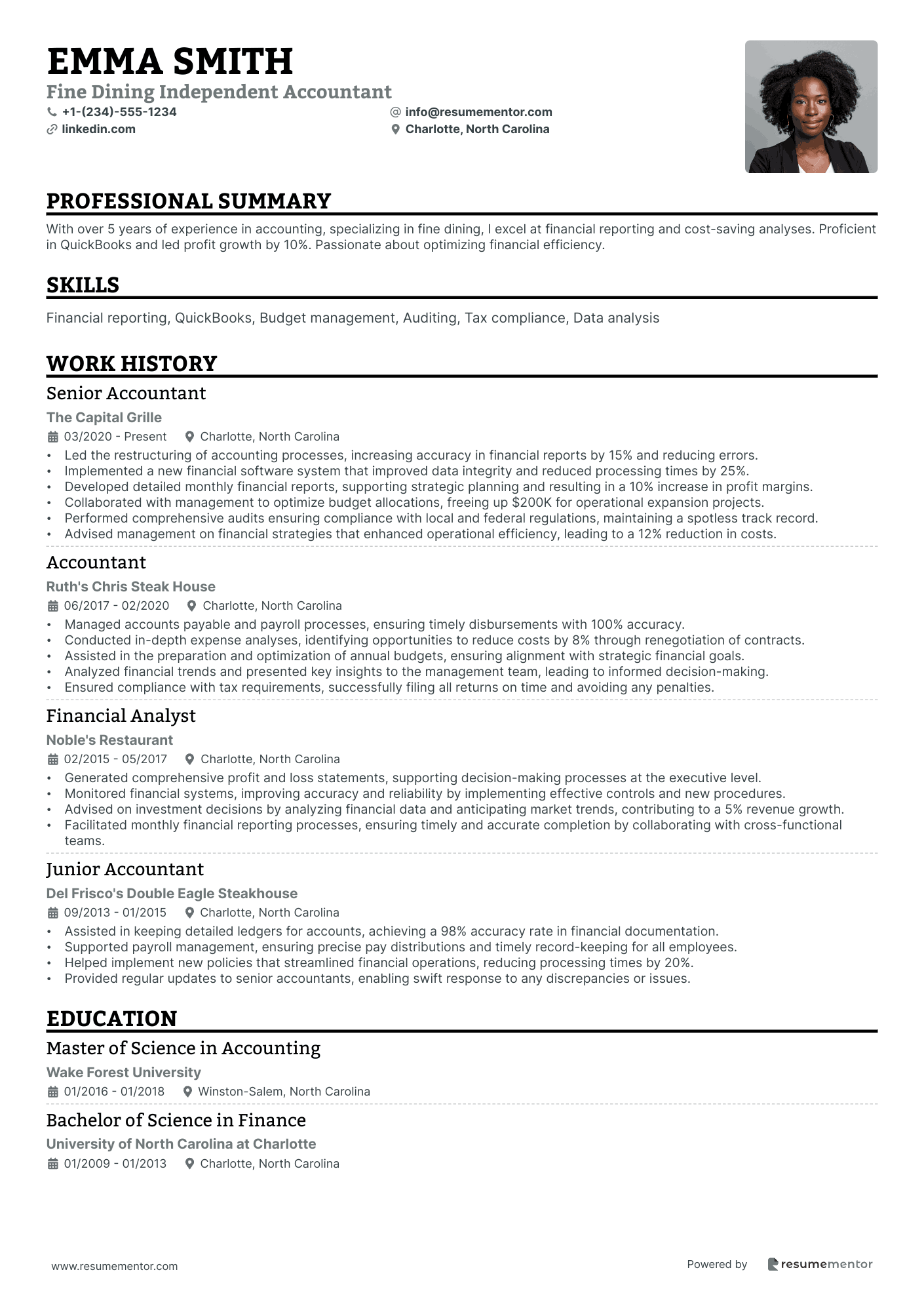
Fine Dining Independent Accountant
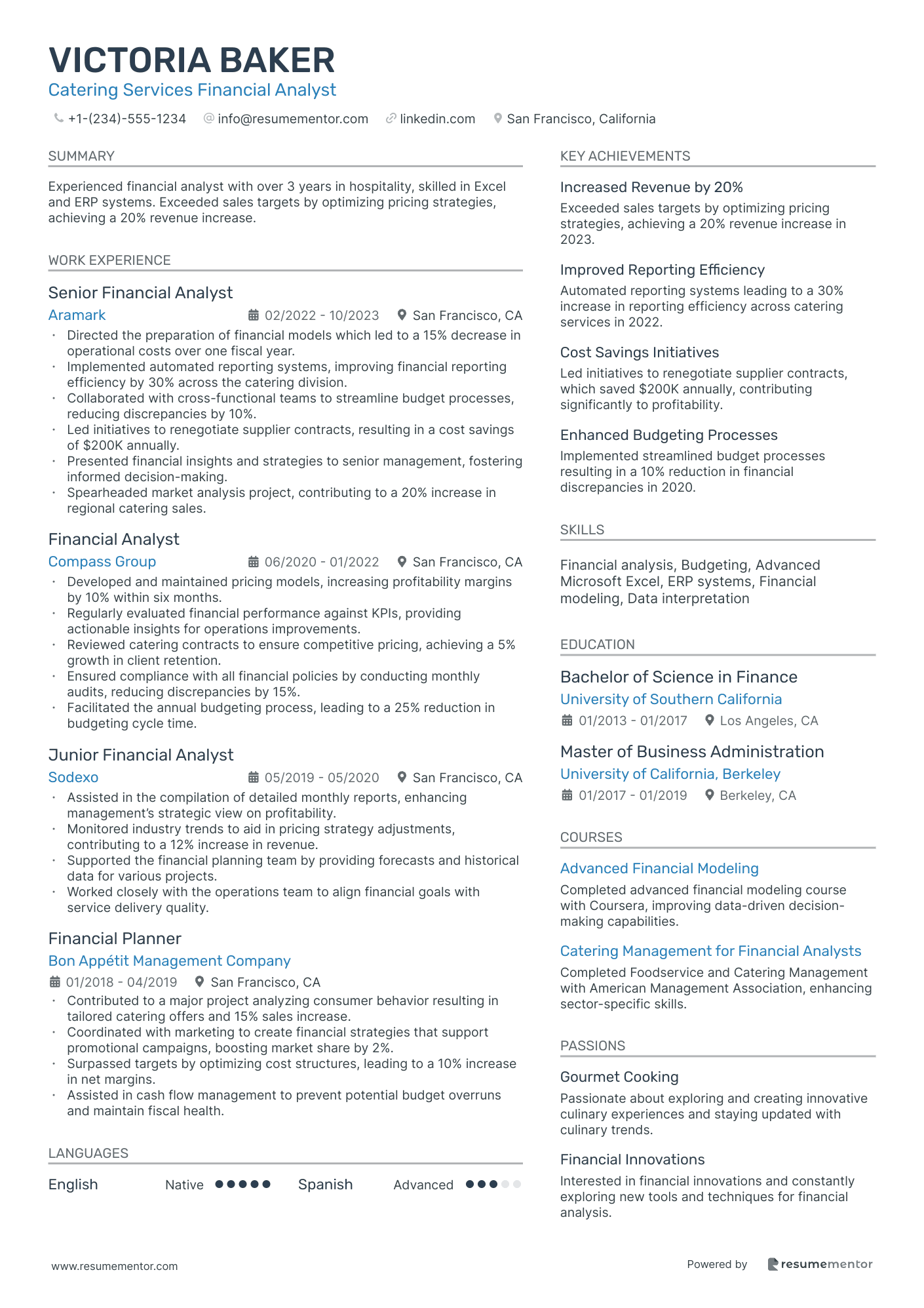
Catering Services Financial Analyst
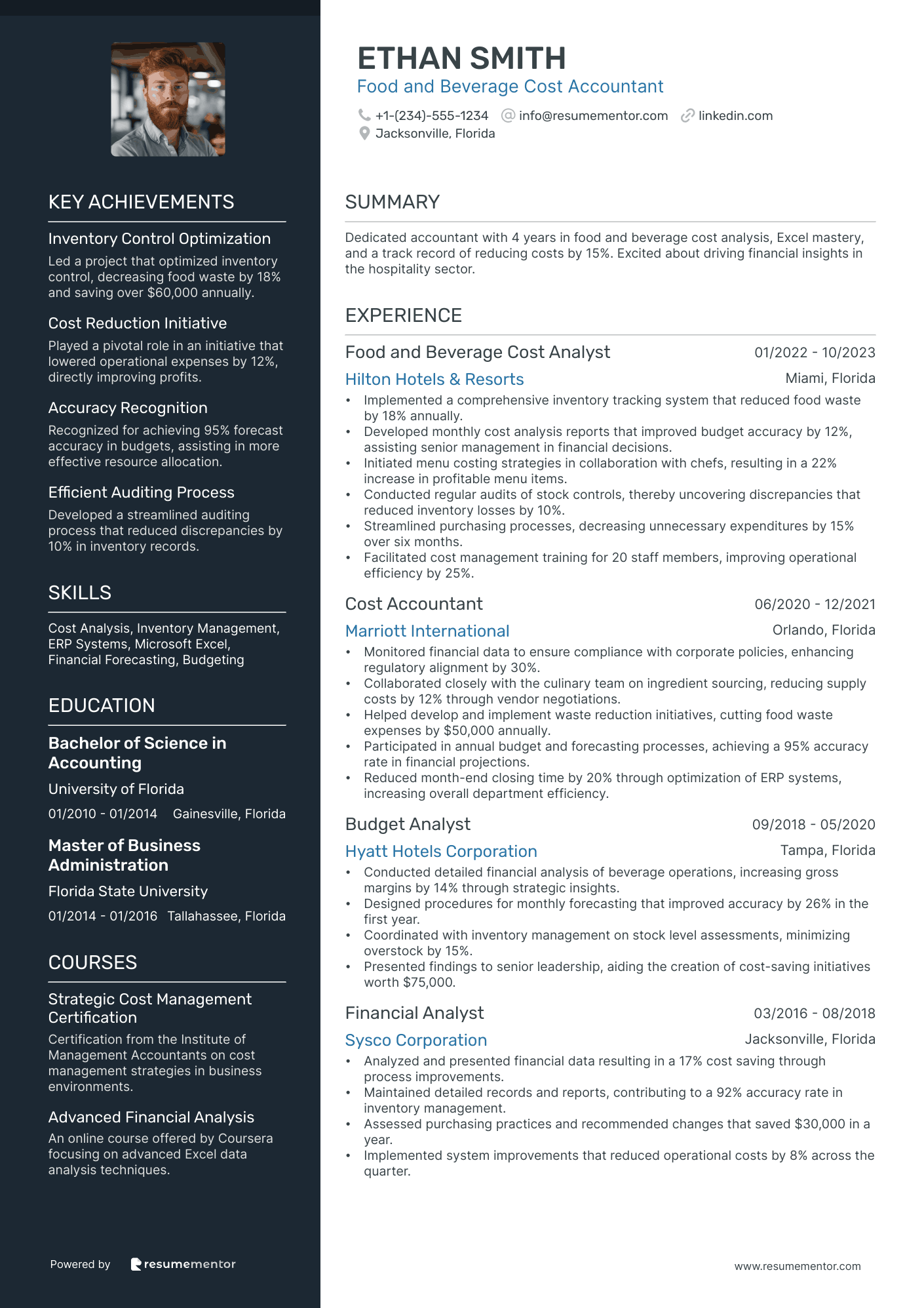
Food and Beverage Cost Accountant
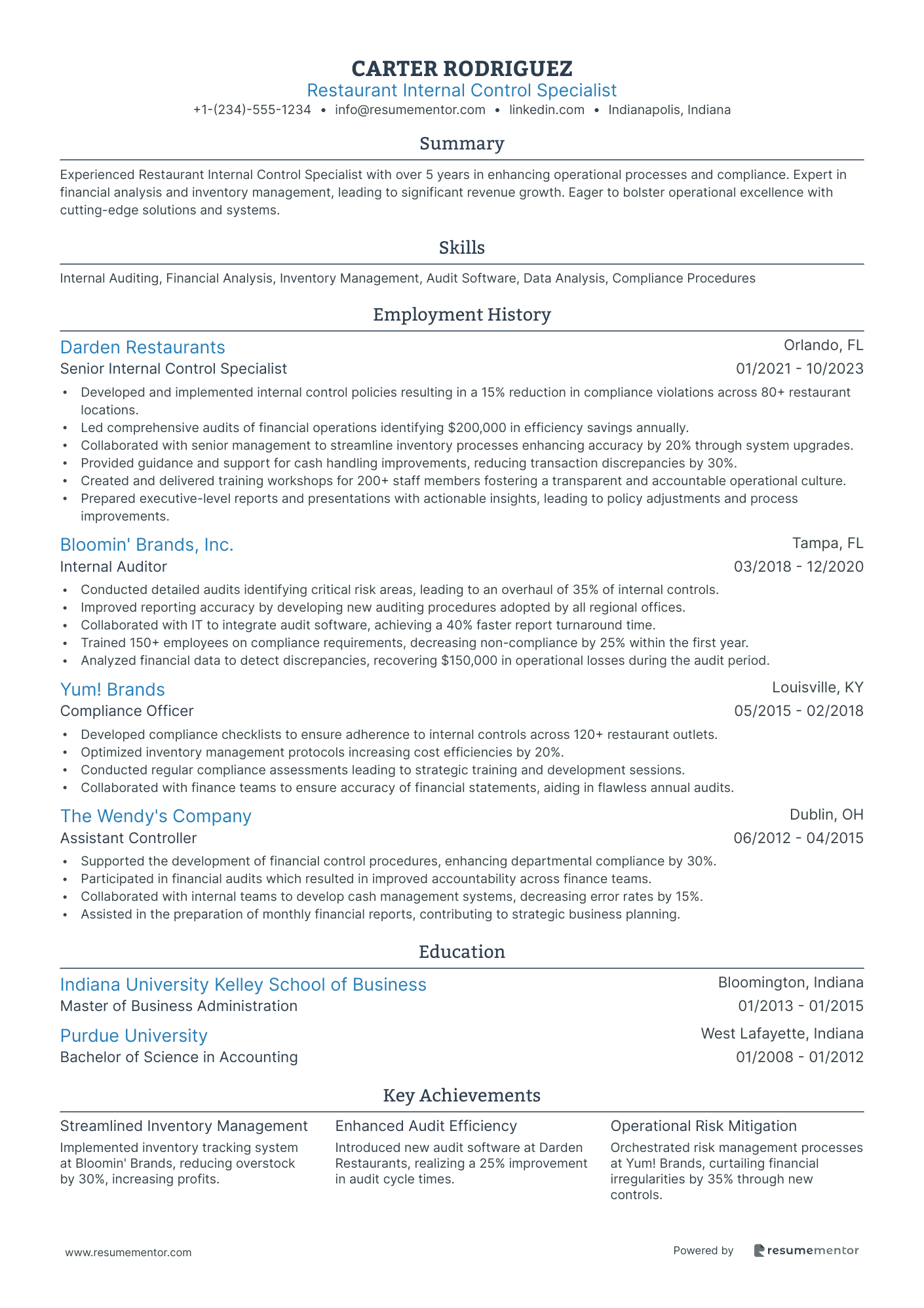
Restaurant Internal Control Specialist

Restaurant Financial Consultant resume sample
- •Collaborated with 15+ restaurants to improve profitability, leading to a cumulative profit increase of 20% year-on-year.
- •Led financial analyses for clients, uncovering $500,000 in potential savings through strategic cost-reduction strategies.
- •Developed and implemented customized budgeting processes for clients, resulting in an average margin improvement of 15%.
- •Conducted workshops to enhance financial literacy among restaurant management teams, achieving an improvement in financial reporting.
- •Monitored industry KPIs and delivered actionable insights, ultimately increasing net income for clients by an average of 25%.
- •Recommended adjustments in resource allocation and operation procedures, leading to a 30% boost in cash flow stability.
- •Managed the monthly financial review process for six major restaurant accounts, enhancing efficiency by 25%.
- •Created dynamic financial models, projecting future revenues and costs, which boosted forecasting accuracy by 18%.
- •Streamlined reporting processes, resulting in a 30% decrease in report generation time on average.
- •Analyzed revenue streams for clients, resulting in strategic adjustments that increased average order value by 12%.
- •Orchestrated the successful training of restaurant staff in the use of financial management systems, leading to a 15% improvement in transaction accuracy.
- •Advised on financial restructuring projects that optimized operational costs, achieving a 10% reduction in overhead expenses.
- •Engaged with high-profile restaurant clients to deliver strategic insights, leading to a 20% increase in return on investment.
- •Developed comprehensive business continuity plans to support financial stability, enhancing client trust and engagement.
- •Implemented comprehensive cash flow management strategies, reducing expenditure leakage by 15% for multiple clients.
- •Assessed client financial health and proposed strategies, improving client profitability by an average of 18%.
- •Conducted in-depth profitability analyses for several restaurant chains, generating insights that enhanced profit margins by 5%.
- •Helped small-scale restaurants implement financial best practices, resulting in a 20% increase in revenue efficiency.
- •Supported teams in optimizing transactional processes, which led to a 10% improvement in processing speeds.
Hospitality Industry Tax Accountant resume sample
- •Managed tax compliance for 10 major hospitality clients, reducing their tax liabilities by 15% collectively through strategic planning.
- •Conducted thorough research on changes in tax legislation, resulting in updated compliance procedures for clients in the restaurant sector.
- •Collaborated with client teams to streamline documentation processes, enhancing efficiency by 20% and reducing data inaccuracies.
- •Developed tailored tax reduction strategies, saving $500k collectively for hotel clients in one fiscal year.
- •Participated in over 30 client meetings annually, ensuring strategic alignment on evolving tax positions and opportunities.
- •Implemented a new tax filing system that decreased filing times by 25%, improving client satisfaction scores by 18%.
- •Prepared comprehensive federal and state tax returns for 15+ hospitality sector businesses, ensuring 100% compliance with current laws.
- •Led training sessions for junior accountants, significantly improving team productivity by 30% in quarterly tax preparations.
- •Assessed potential implications of mergers for restaurant clients, offering insights that led to a 12% reduction in anticipated tax liabilities.
- •Fostered strong client relations that resulted in a 25% increase in contractor trust and business retention over two years.
- •Developed an advanced analytical tool for tracking tax credits, aiding hotels to identify $100k in potential savings.
- •Assisted in the preparation and review of tax returns for diverse hospitality clients, ensuring error-free filings.
- •Collaborated with a team to overhaul client accounting processes, achieving a 40% increase in process efficiency.
- •Conducted research on international tax law changes, enhancing the team's capability to manage complex global transactions.
- •Provided detailed analytics to support client tax planning, contributing to a 10% increase in forecasted revenue.
- •Supported senior accountants in tax preparation projects, gaining recognition for accuracy and timeliness.
- •Enhanced client financial documentation management systems, reducing processing errors by 15%.
- •Researched state-specific tax legislations, assisting teams in maintaining compliance for multiple clients.
- •Participated in bi-weekly training to upkeep knowledge of tax software, improving task execution efficiency.
Restaurant Payroll Specialist resume sample
- •Managed payroll processing for over 500 employees bi-weekly, reducing processing errors by 30% through implementation of more effective auditing procedures.
- •Coordinated with HR and improved onboarding, which decreased payroll issues by 20% within six months.
- •Delivered timely resolutions to payroll inquiries, improving employee satisfaction ratings by 15%.
- •Developed and implemented payroll policies, resulting in increased process efficiency and compliance adherence.
- •Designed training sessions for new hires about payroll systems, enhancing overall understanding by 40%.
- •Successfully managed year-end W-2 processing with 98% accuracy in less than one month.
- •Led the payroll process for three restaurant chains, improving processing speed by 25% using detailed checklist systems.
- •Performed compliance reviews and audits, which increased adherence to payroll laws, reducing legal risks by 40%.
- •Resolved over 150 payroll discrepancies monthly, enhancing employee trust and accuracy of records.
- •Collaborated with accounting to streamline payroll account reconciliations, improving accuracy by 22%.
- •Assisted with state and federal payroll tax filings, resulting in timely submissions and 100% compliance.
- •Processed payroll for a diverse team of 350 employees, ensuring 95% accuracy through detailed checks.
- •Implemented a new payroll system which streamlined operations and reduced manual input time by 20%.
- •Handled sensitive employee data with 100% confidentiality and security compliance.
- •Contributed to the development of a new employee query system, reducing response times by 50%.
- •Processed invoices and managed payment schedules, maintaining a 99% on-time payment rate.
- •Reconciled vendor statements monthly, reducing inconsistencies by 25% and improving vendor relations.
- •Assisted with monthly close procedures, enhancing financial accuracy and reporting efficiency.
- •Monitored purchase orders and maintained records, ensuring compliance and saving 15% in costs through effective tracking.
Food Service Revenue Accountant resume sample
- •Managed and reconciled $500,000 in daily revenue transactions, enhancing accuracy and reducing discrepancies by 30%.
- •Developed monthly financial reports that improved accuracy of revenue forecasts by 20% through data analysis.
- •Collaborated with food service teams to ensure menu changes were accurately reflected, leading to a 15% increase in overall efficiency.
- •Monitored variances against budget, delivering insights that resulted in a $50,000 savings in annual costs.
- •Supported annual budget preparation with strategic planning input, achieving better alignment with organizational goals.
- •Implemented internal controls that streamlined revenue safeguarding processes, decreasing error rates by 25%.
- •Prepared and analyzed financial statements with a 98% accuracy rate, supporting key decision-making processes.
- •Assisted in configuring ERP systems for more efficient revenue recognition, reducing processing time by 40%.
- •Trained 10 accounting staff on new software usage, improving team proficiency and data handling by 35%.
- •Collaborated with management to draft strategic improvement plans, enhancing food service profitability by 10%.
- •Streamlined audit preparation processes, expediting audits and achieving positive results with 50% fewer queries.
- •Reviewed revenue transactions accurately, enabling improved tracking and resulting in a 15% decrease in reporting errors.
- •Analyzed financial data trends to identify discrepancies early, leading to a 20% increase in corrective efficiency.
- •Worked closely with food service leaders to ensure revenue data accuracy, optimizing pricing strategies.
- •Provided support and documentation to auditors, ensuring a smooth auditing process and reducing inquiry duration by 20%.
- •Supported reconciliation of $2 million monthly revenue, improving efficiency and accuracy by introducing automated systems.
- •Assisted in revenue documentation and reporting, contributing to a 10% increase in financial close accuracy.
- •Coordinated with finance team to develop training for revenue management, resulting in enhanced routine task efficiency.
- •Enhanced record-keeping processes to improve compliance, reducing discrepancies and audit concerns by 15%.
Restaurant Financial Auditor resume sample
- •Conducted over 50 audits across multiple restaurants, identifying financial discrepancies, which led to an 18% increase in accuracy.
- •Developed comprehensive audit programs tailored to specific restaurant needs, streamlining the auditing process by 20%.
- •Collaborated with restaurant stakeholders to address financial control inefficiencies, achieving a 25% reduction in financial risks.
- •Trained 10 staff members on new financial auditing software, enhancing report generation speed by 30%.
- •Reported findings directly to executive management, influencing financial strategy and securing $1 million in cost savings.
- •Implemented corrective action plans for identified issues, resulting in improved financial statement accuracy by 15%.
- •Performed detailed auditing of financial statements, which reduced reporting errors by 22% year-over-year.
- •Analyzed transactions and internal controls and proposed enhancements, increasing efficiency by 28%.
- •Assessed compliance with industry regulations, leading to a 30% improvement in regulatory compliance scores.
- •Prepared 45 comprehensive audit reports, providing actionable insights for financial improvements across restaurant branches.
- •Led follow-up audits to ensure adherence to recommended changes, maintaining 100% compliance with standards.
- •Assisted in the preparation of financial reports, reducing preparation time by 25% through process optimization.
- •Implemented new accounting software, increasing the speed of financial data access and analysis by 30%.
- •Reconciled discrepancies in 60 financial statements monthly, enhancing data reliability and reducing errors by 18%.
- •Collaborated with finance teams to streamline reporting processes, resulting in a 20% increase in efficiency.
- •Participated in audit planning and execution, contributing to decreased audit completion times by 15%.
- •Reviewed financial records and identified discrepancies, achieving a 10% improvement in statement accuracy.
- •Monitored compliance with financial regulations, enhancing compliance levels by 20%.
- •Engaged with management to discuss findings, strengthening the accuracy of financial practices.
Quick Service Restaurant Accountant resume sample
- •Prepared and analyzed monthly financial statements for 15 locations, resulting in a 10% improvement in reporting accuracy.
- •Conducted detailed bank reconciliation monthly, identifying and rectifying discrepancies, preventing potential losses amounting to $25,000 annually.
- •Provided management with financial insights and forecasts, leading to a strategic decision that increased quarterly profits by 8%.
- •Participated in regulatory compliance and tax filing processes, achieving a 100% on-time submission and 5% tax savings.
- •Monitored cash flow operations, enhancing liquidity management across the operations, sustaining a 25% cash reserve increase.
- •Led a cross-functional project optimizing payroll processes, resulting in a 20% reduction in payroll errors and processing time.
- •Managed financial statements and budgets for a portfolio of 12 restaurant locations, improving budget adherence by 15%.
- •Designed financial analysis models to assess cost control measures, significantly increasing profitability by 7%.
- •Collaborated with restaurant managers to implement financial performance improvements, cutting unnecessary expenses by 10%.
- •Ensured compliance with financial regulations, passing external audits with zero major findings over three years.
- •Presented financial reports to senior management quarterly, enabling data-driven decisions that contributed to revenue enhancements.
- •Supported the preparation of monthly closing reports, enhancing the overall efficiency by 20% in financial reporting timelines.
- •Assisted in cash flow monitoring, ensuring consistent operation abilities, with a focus on minimizing liquidity risks.
- •Participated in annual budget preparation, working closely with management to achieve a comprehensive fiscal outlook.
- •Maintained accurate transaction records, reducing financial discrepancies between departments by 50%.
- •Streamlined invoice processing systems, reducing processing errors by 15% and improving turnaround by two days.
- •Conducted thorough financial analysis for management use, directly contributing to strategic decisions reducing overhead by 12%.
- •Implemented standardized accounting practices, aligning operations with best practices and reducing audit risks by 6%.
- •Enhanced financial reporting processes, enabling timely production of actionable financial insights, boosting quick decision-making.
- •Assessed and managed financial risks within budget frameworks, achieving a favorable adjustment in projected expenditures.
Fine Dining Independent Accountant resume sample
- •Led the restructuring of accounting processes, increasing accuracy in financial reports by 15% and reducing errors.
- •Implemented a new financial software system that improved data integrity and reduced processing times by 25%.
- •Developed detailed monthly financial reports, supporting strategic planning and resulting in a 10% increase in profit margins.
- •Collaborated with management to optimize budget allocations, freeing up $200K for operational expansion projects.
- •Performed comprehensive audits ensuring compliance with local and federal regulations, maintaining a spotless track record.
- •Advised management on financial strategies that enhanced operational efficiency, leading to a 12% reduction in costs.
- •Managed accounts payable and payroll processes, ensuring timely disbursements with 100% accuracy.
- •Conducted in-depth expense analyses, identifying opportunities to reduce costs by 8% through renegotiation of contracts.
- •Assisted in the preparation and optimization of annual budgets, ensuring alignment with strategic financial goals.
- •Analyzed financial trends and presented key insights to the management team, leading to informed decision-making.
- •Ensured compliance with tax requirements, successfully filing all returns on time and avoiding any penalties.
- •Generated comprehensive profit and loss statements, supporting decision-making processes at the executive level.
- •Monitored financial systems, improving accuracy and reliability by implementing effective controls and new procedures.
- •Advised on investment decisions by analyzing financial data and anticipating market trends, contributing to a 5% revenue growth.
- •Facilitated monthly financial reporting processes, ensuring timely and accurate completion by collaborating with cross-functional teams.
- •Assisted in keeping detailed ledgers for accounts, achieving a 98% accuracy rate in financial documentation.
- •Supported payroll management, ensuring precise pay distributions and timely record-keeping for all employees.
- •Helped implement new policies that streamlined financial operations, reducing processing times by 20%.
- •Provided regular updates to senior accountants, enabling swift response to any discrepancies or issues.
Catering Services Financial Analyst resume sample
- •Directed the preparation of financial models which led to a 15% decrease in operational costs over one fiscal year.
- •Implemented automated reporting systems, improving financial reporting efficiency by 30% across the catering division.
- •Collaborated with cross-functional teams to streamline budget processes, reducing discrepancies by 10%.
- •Led initiatives to renegotiate supplier contracts, resulting in a cost savings of $200K annually.
- •Presented financial insights and strategies to senior management, fostering informed decision-making.
- •Spearheaded market analysis project, contributing to a 20% increase in regional catering sales.
- •Developed and maintained pricing models, increasing profitability margins by 10% within six months.
- •Regularly evaluated financial performance against KPIs, providing actionable insights for operations improvements.
- •Reviewed catering contracts to ensure competitive pricing, achieving a 5% growth in client retention.
- •Ensured compliance with all financial policies by conducting monthly audits, reducing discrepancies by 15%.
- •Facilitated the annual budgeting process, leading to a 25% reduction in budgeting cycle time.
- •Assisted in the compilation of detailed monthly reports, enhancing management’s strategic view on profitability.
- •Monitored industry trends to aid in pricing strategy adjustments, contributing to a 12% increase in revenue.
- •Supported the financial planning team by providing forecasts and historical data for various projects.
- •Worked closely with the operations team to align financial goals with service delivery quality.
- •Contributed to a major project analyzing consumer behavior resulting in tailored catering offers and 15% sales increase.
- •Coordinated with marketing to create financial strategies that support promotional campaigns, boosting market share by 2%.
- •Surpassed targets by optimizing cost structures, leading to a 10% increase in net margins.
- •Assisted in cash flow management to prevent potential budget overruns and maintain fiscal health.
Food and Beverage Cost Accountant resume sample
- •Implemented a comprehensive inventory tracking system that reduced food waste by 18% annually.
- •Developed monthly cost analysis reports that improved budget accuracy by 12%, assisting senior management in financial decisions.
- •Initiated menu costing strategies in collaboration with chefs, resulting in a 22% increase in profitable menu items.
- •Conducted regular audits of stock controls, thereby uncovering discrepancies that reduced inventory losses by 10%.
- •Streamlined purchasing processes, decreasing unnecessary expenditures by 15% over six months.
- •Facilitated cost management training for 20 staff members, improving operational efficiency by 25%.
- •Monitored financial data to ensure compliance with corporate policies, enhancing regulatory alignment by 30%.
- •Collaborated closely with the culinary team on ingredient sourcing, reducing supply costs by 12% through vendor negotiations.
- •Helped develop and implement waste reduction initiatives, cutting food waste expenses by $50,000 annually.
- •Participated in annual budget and forecasting processes, achieving a 95% accuracy rate in financial projections.
- •Reduced month-end closing time by 20% through optimization of ERP systems, increasing overall department efficiency.
- •Conducted detailed financial analysis of beverage operations, increasing gross margins by 14% through strategic insights.
- •Designed procedures for monthly forecasting that improved accuracy by 26% in the first year.
- •Coordinated with inventory management on stock level assessments, minimizing overstock by 15%.
- •Presented findings to senior leadership, aiding the creation of cost-saving initiatives worth $75,000.
- •Analyzed and presented financial data resulting in a 17% cost saving through process improvements.
- •Maintained detailed records and reports, contributing to a 92% accuracy rate in inventory management.
- •Assessed purchasing practices and recommended changes that saved $30,000 in a year.
- •Implemented system improvements that reduced operational costs by 8% across the quarter.
Restaurant Internal Control Specialist resume sample
- •Developed and implemented internal control policies resulting in a 15% reduction in compliance violations across 80+ restaurant locations.
- •Led comprehensive audits of financial operations identifying $200,000 in efficiency savings annually.
- •Collaborated with senior management to streamline inventory processes enhancing accuracy by 20% through system upgrades.
- •Provided guidance and support for cash handling improvements, reducing transaction discrepancies by 30%.
- •Created and delivered training workshops for 200+ staff members fostering a transparent and accountable operational culture.
- •Prepared executive-level reports and presentations with actionable insights, leading to policy adjustments and process improvements.
- •Conducted detailed audits identifying critical risk areas, leading to an overhaul of 35% of internal controls.
- •Improved reporting accuracy by developing new auditing procedures adopted by all regional offices.
- •Collaborated with IT to integrate audit software, achieving a 40% faster report turnaround time.
- •Trained 150+ employees on compliance requirements, decreasing non-compliance by 25% within the first year.
- •Analyzed financial data to detect discrepancies, recovering $150,000 in operational losses during the audit period.
- •Developed compliance checklists to ensure adherence to internal controls across 120+ restaurant outlets.
- •Optimized inventory management protocols increasing cost efficiencies by 20%.
- •Conducted regular compliance assessments leading to strategic training and development sessions.
- •Collaborated with finance teams to ensure accuracy of financial statements, aiding in flawless annual audits.
- •Supported the development of financial control procedures, enhancing departmental compliance by 30%.
- •Participated in financial audits which resulted in improved accountability across finance teams.
- •Collaborated with internal teams to develop cash management systems, decreasing error rates by 15%.
- •Assisted in the preparation of monthly financial reports, contributing to strategic business planning.
Navigating the finances of a restaurant is like perfecting a complex dish; every detail matters and precision is key. Crafting a standout resume requires the same meticulous attention. As a restaurant accountant, you manage numbers to keep operations running smoothly, but translating those duties into a compelling resume can be challenging. It's crucial to highlight your financial expertise and problem-solving skills to capture potential employers' attention.
Your resume serves as your first impression, showcasing your attention to detail and financial acumen. To help structure your information effectively, using a resume template provides a clear and consistent format. This approach allows you to focus on emphasizing your valuable skills, including your key accounting achievements and restaurant-specific experience. Consider exploring resume templates to streamline your process.
By articulating your professional experiences precisely, you demonstrate your capability, while thoughtful word choices underscore your technical skills. A well-organized resume can truly set you apart, effectively conveying your ability to manage complex finances in a bustling restaurant environment. Ultimately, your goal is to weave your unique skills and achievements into a cohesive and compelling narrative. Let's work together to create a resume that truly reflects your dedication to excellence in the world of restaurant accounting.
Key Takeaways
- Crafting a standout restaurant accountant resume requires emphasizing your financial expertise and problem-solving skills, presenting them in a clear, consistent format using resume templates.
- Your resume should effectively convey your ability to manage complex finances in a restaurant setting and include quantifiable achievements that demonstrate your capability.
- Choose a chronological format to highlight career progression, and ensure your resume is visually appealing with modern fonts and preserved formatting by saving it as a PDF.
- Tailor your experience section to align with the job requirements by incorporating keywords and using action words to highlight your contributions.
- Include additional sections such as certifications, skills, and education, focusing on both hard skills (like accounting software proficiency) and soft skills (such as problem-solving), to provide a comprehensive view of your qualifications.
What to focus on when writing your restaurant accountant resume
A restaurant accountant resume should clearly convey your expertise in managing financial records and budgeting, with a focus on handling payroll in the restaurant industry. This demonstrates your ability to meet a restaurant's financial needs while ensuring compliance with industry standards.
How to structure your restaurant accountant resume
- Summary or Objective: Provide a snapshot of your experience and skills tailored to restaurant accounting, emphasizing cost analysis and financial reporting—this section sets the tone for your application, showing how you meet the specific demands of the role.
- Professional Experience: Detail past roles where you successfully tracked inventory costs, managed financial statements, or optimized budgets specifically for restaurants—analyzing your experience in this section allows recruiters to see the depth of your involvement in the industry.
- Education: Share your educational background, highlighting your degree or certification, such as an accounting degree or CPA, with an emphasis on the hospitality industry—this shows your foundational knowledge and dedication to accounting with a focus on restaurant needs.
- Skills: Highlight vital skills like proficiency in accounting software (e.g., QuickBooks) and knowledge of restaurant tax regulations, demonstrating your strong numerical abilities—this gives insight into the tools and methods you use to achieve accuracy and efficiency in your work.
- Certifications: Feature any relevant certifications, such as Certified Management Accountant (CMA) or Certified Public Accountant (CPA), to underscore your specialized expertise in restaurant accounting—certifications validate your advanced skills and commitment to your professional growth.
You can deepen your resume’s impact by adding optional sections like "Professional Affiliations" or "Industry Recognition," which can further distinguish you in the field. Below, we'll cover each section more in-depth along with how to format your resume effectively.
Which resume format to choose
Creating a resume as a restaurant accountant requires choosing the right format to effectively highlight your skills and experience. The chronological format is ideal as it showcases your career progression, making it easy for employers within the restaurant industry to see your stability and growth over time. When selecting fonts, consider modern options like Raleway, Lato, or Montserrat. These fonts not only offer a sleek and professional appearance but also enhance readability, which is crucial when presenting detailed financial information.
Saving your resume as a PDF is essential. This file type preserves your formatting across different devices and operating systems, ensuring that your resume looks professional and polished wherever it’s viewed. Additionally, maintaining 1-inch margins on all sides will provide a clean and organized layout, making your resume easy to read and visually appealing. By focusing on these elements, your resume will reflect the precision and attention to detail required in a restaurant accountant role, impressing potential employers with its clarity and professionalism.
How to write a quantifiable resume experience section
The experience section of your restaurant accountant resume is crucial for highlighting your financial skills and accomplishments in the industry. Begin by ordering your roles from the most recent to older positions, covering the past 10-15 years to provide a comprehensive overview. Align your job titles with those mentioned in the job ad, ensuring that each role demonstrates your expertise and relevance. Tailor your resume by incorporating keywords and requirements directly from the job posting, which helps position you as an ideal candidate. Use impactful action words like "optimized," "streamlined," "analyzed," and "implemented" to effectively communicate your contributions and impact.
Here's an example of a strong, flowing experience section:
- •Reduced food cost variance by 15% through meticulous inventory analysis and vendor negotiation.
- •Streamlined payroll systems, cutting processing times by 20%, enhancing team efficiency.
- •Implemented a new bookkeeping system, increasing financial report accuracy and reducing errors by 30%.
- •Led a team to achieve a 25% reduction in operating expenses through detailed budget planning.
This section effectively communicates your role as an indispensable part of a restaurant's success, thanks to clear, quantifiable achievements. Each bullet point builds upon the previous one, showing a continuous story of impact and improvement. By focusing on significant outcomes like reducing costs and enhancing accuracy, you demonstrate the tangible benefits of your work. The integration of action words adds dynamism and engagement, making your contributions unmistakable. Tailoring your resume to mirror the job's demands ensures that you're not just detailing past experiences but aligning your capabilities with future success. This cohesive narrative of your career positions you as a key player in optimizing and transforming a restaurant's financial health.
Achievement-Focused resume experience section
An achievement-focused resume experience section for a restaurant accountant should demonstrate how your work has contributed to the establishment's financial health and operational efficiency. Highlight specific accomplishments like cost savings, revenue growth, and process improvements. Incorporating quantifiable metrics helps provide a clear picture of your impact. For example, rather than simply stating that you managed budgets, you could specify the size and complexity of the budgets you oversaw, showcasing your expertise.
Begin by listing the time period you worked, your job title, and the name of the restaurant. Under each entry, use bullet points to detail your achievements or main responsibilities. Each bullet point should be concise yet provide enough detail to convey your contributions. Focus on outcomes that highlight your skills in financial management, budgeting, and auditing, and illustrate your problem-solving abilities. Tailor these points to emphasize how your role directly supported the restaurant’s goals and success.
Restaurant Accountant
The Gourmet Bistro
June 2019 - Present
- Boosted profit margins by 15% each year through effective cost management.
- Streamlined the accounts payable process, reducing payment errors by 25%.
- Enhanced forecast accuracy by 30% with the development of a new budgeting system.
- Implemented an inventory control system, lowering food waste by 10%.
Project-Focused resume experience section
A project-focused restaurant accountant resume experience section should emphasize how your skills and efforts contributed to successful projects. Start by zeroing in on particular tasks that allowed you to make a significant impact. Choose a project where your involvement led to a tangible outcome and use descriptive action words to detail your contributions, ensuring you provide context about the project’s scope.
Incorporate key responsibilities such as budgeting and financial management, illustrating how these tasks positively influenced the restaurant’s operations. By showcasing measurable achievements like cost reductions or increased efficiency, you draw a clear line between your efforts and their results. Employing concise bullet points ensures your experience section is easy to read and effectively draws attention to your accomplishments and level of expertise.
Restaurant Accountant
Delightful Eats Restaurant
June 2020 - Present
- Designed a budget plan that cut operational costs by 15%.
- Kept daily financial transactions accurate and compliant.
- Worked with managers to roll out cost-saving strategies.
- Created monthly reports that boosted financial transparency.
Industry-Specific Focus resume experience section
A restaurant-focused accountant resume experience section should spotlight your expertise in managing financial operations within the hospitality industry. Start by listing your work experiences in chronological order, clearly noting your job titles, workplace names, and tenure dates. Under each position, use concise bullet points to describe your accomplishments and responsibilities, emphasizing your skills in bookkeeping, financial analysis, and budget management specific to restaurants. Incorporate figures or percentages that demonstrate your impact, such as improved financial reporting accuracy or cost savings, to give a tangible sense of your contributions.
Ensuring a smooth flow, each bullet point should clearly show how your efforts benefited the restaurant. Use action verbs to highlight your initiative and accomplishments. Your proficiency with industry-specific financial software and collaboration with management on financial planning are crucial aspects to include, demonstrating your ability to enhance a restaurant’s financial health and facilitate growth. Tailor your experience to reflect the unique financial challenges of the restaurant sector, emphasizing your problem-solving abilities and attention to detail as key assets.
Accountant
Culinary Haven
June 2018 - July 2021
- Managed daily bookkeeping and financial records for a busy upscale restaurant, ensuring accuracy and compliance.
- Implemented a new inventory tracking system that reduced monthly costs by 15%, leading to significant savings.
- Collaborated with management to develop annual budgets and financial forecasts, improving strategic planning.
- Prepared and analyzed financial statements, offering insights that optimized cash flow and increased profit margins.
Leadership-Focused resume experience section
A leadership-focused restaurant accountant resume experience section should seamlessly showcase your ability to guide teams and enhance financial outcomes. Begin by highlighting your leadership roles and paint a picture of how you successfully led your team to meet financial targets. Share specific examples of improvements in financial processes that boosted efficiency, reduced costs, or increased profitability. Quantifying your accomplishments with numbers or percentages adds credibility and demonstrates the tangible impact of your leadership.
To make your experience shine, use strong action verbs and place emphasis on what you achieved. Illustrate your ability to collaborate with other departments, mentor junior staff, or lead projects to successful completion. Keep your bullet points concise, yet full of relevant details that align with the role you're applying for, showing off achievements that fit the job description. Clearly presenting your skills and accomplishments will give potential employers a vivid understanding of how you can drive financial success for their business.
Senior Accountant
Gourmet Dining Inc.
June 2019 - September 2023
- Led a team of four accountants to streamline accounting processes, reducing errors by 20%.
- Implemented a new inventory tracking system that cut waste expenses by 15%.
- Developed monthly financial reports that improved budgeting accuracy by 10%.
- Trained junior accountants on financial analysis, increasing team efficiency.
Write your restaurant accountant resume summary section
A restaurant-focused accountant resume summary should capture the essence of your skills and achievements in a way that sets you apart. This section is crucial as it provides a quick snapshot of what makes you the right fit for the role. For those with experience, it's key to showcase your accomplishments and skills effectively. Consider this example:
With the example, you get a sense of how expertise, tangible results, and core responsibilities come together to tell a compelling story. If you're new to the field, a resume objective could be a better approach, focusing on your aspirations and how they align with the job. Understanding the difference between a summary and an objective is key—a summary highlights past experiences, while an objective looks to the future. Meanwhile, a resume profile blends career achievements and soft skills. A summary of qualifications lists key career milestones. Tailoring your resume's opening section to reflect your unique strengths and align with the employer’s needs can make all the difference in capturing their interest right away.
Listing your restaurant accountant skills on your resume
A skills-focused restaurant accountant resume should be clear and focused, emphasizing the competencies most valuable to the role. You can choose to have this section as a standalone feature or integrate it into parts like your experience and summary. Highlighting your strengths and soft skills on your resume can show your ability to work well with others and excel in your job. Meanwhile, hard skills are the specific capabilities you've acquired, such as using accounting software. Both your skills and strengths can serve as keywords, which makes your resume more attractive to employers and applicant tracking systems.
Here's an example of how to organize your skills section in JSON format, tailored for a restaurant accountant:
This carefully curated skills section targets the essential abilities needed for a restaurant accountant role, indicating your understanding of what the job requires. By using these keywords strategically, you highlight your valuable skills to potential employers.
Best hard skills to feature on your restaurant accountant resume
Hard skills demonstrate your technical capabilities and should align with what employers seek. As a restaurant accountant, possessing these skills underscores your ability to manage a restaurant’s finances seamlessly.
Hard Skills
- Inventory Management
- Financial Reporting
- Budgeting and Forecasting
- Cost Analysis
- Tax Preparation and Filing
- POS System Proficiency
- Microsoft Excel Expertise
- Accounts Payable and Receivable
- Profit and Loss Analysis
- QuickBooks or Similar Software
- Financial Compliance Knowledge
- Revenue Cycle Management
- Business Financial Planning
- Data Entry Accuracy
- Payroll Management
Best soft skills to feature on your restaurant accountant resume
Soft skills reflect how you communicate and interact at work. In a restaurant accountant role, these abilities show your capacity to manage relationships, solve problems, and maintain organization.
Soft Skills
- Attention to Detail
- Analytical Thinking
- Communication Skills
- Problem-Solving Abilities
- Time Management
- Interpersonal Skills
- Team Collaboration
- Adaptability
- Leadership Potential
- Customer Service Orientation
- Emotional Intelligence
- Negotiation Skills
- Dependability
- Stress Management
- Organizational Skills
How to include your education on your resume
An education section is an important component of your resume, as it highlights your academic background and can make you stand out to potential employers. It's crucial to tailor this section specifically to the accounting role you're applying for, excluding any education that does not contribute to your credibility for the position. When mentioning your GPA, include it only if it's impressive, typically 3.0 or higher; format it as "GPA: 3.8/4.0". Honors such as "cum laude" should be noted in italics or parentheses next to your degree, e.g., "Bachelor of Science in Accounting, cum laude". Clearly state your degree by listing it first, such as "Bachelor of Science in Accounting".
In the first example, an irrelevant degree with a lower GPA is included, making it a weak entry. The second example, however, highlights a relevant degree with a strong GPA from a reputable institution. This example effectively demonstrates qualifications specific to a restaurant accountant role. Including a relevant degree establishes expertise and confidence in handling the financial aspects of a restaurant, ensuring that your credentials align with employer expectations.
How to include restaurant accountant certificates on your resume
Adding a certificates section to your restaurant accountant resume is crucial. This part showcases your additional training and qualifications, making you stand out to employers. You can also include certificates in the header for quick reference.
Start by listing the name of the certificate. Include the date you received it to show your current expertise. Add the issuing organization because it verifies the authenticity of your credential. Ensure all information is accurate and easy to read.
Here's an example in JSON:
This example works well because it includes relevant certificates for a restaurant accountant, like "Certified Management Accountant" and "Certified Public Accountant." These credentials are issued by recognized organizations, adding credibility to your resume. The "Restaurant Management Certification" is particularly relevant, showing you have specialized skills in the restaurant industry. By clearly stating the certificates and their issuers, you demonstrate to prospective employers that you have the necessary qualifications for the role.
Extra sections to include in your restaurant accountant resume
As a restaurant accountant, your resume needs to showcase your financial expertise while also highlighting your diverse skills and interests. Ensuring your resume is well-rounded gives potential employers a fuller picture of your capabilities and character.
- Language section — Highlight your ability to speak multiple languages. This showcases your communication skills and can be particularly valuable in a multicultural work environment.
- Hobbies and interests section — Show your personality and problem-solving skills through hobbies. This can make you more relatable and demonstrate your ability to handle stress.
- Volunteer work section — Highlight your commitment to the community. This demonstrates your character and your willingness to go beyond your job duties.
- Books section — Mention books that you have read related to finance or management. This shows your commitment to personal growth and staying updated in your field.
Adding these sections can help your resume stand out. They give potential employers a well-rounded view of you. This could be the key to landing your desired job in restaurant accounting.
In Conclusion
In conclusion, crafting a powerful restaurant accountant resume requires you to focus on highlighting your unique blend of skills and experience. The role demands a keen attention to detail and an aptitude for financial management, which should be clearly reflected in your resume. Incorporate a well-structured format that showcases your ability to optimize processes, reduce costs, and enhance financial accuracy. Highlighting your certifications and relevant education ensures that your qualifications are immediately apparent, adding credibility to your application. Including measurable achievements within your experience section emphasizes your contributions to previous employers, making your impact tangible. Additionally, a strong skills section with both hard and soft competencies demonstrates your readiness to excel in the restaurant accounting field. Tailoring your resume to mirror the job's demands positions you as the ideal candidate for potential employers. By considering these elements, your resume will create a lasting impression, effectively opening doors to new opportunities in the dynamic world of restaurant accounting. Prioritize your strengths and align them with the specific needs of the employer to stand out in a competitive job market. Building a resume that is as dynamic and precise as your role as an accountant ensures you're set to secure your next position.
Related Articles

Continue Reading
Check more recommended readings to get the job of your dreams.
Resume
Resources
Tools
© 2026. All rights reserved.
Made with love by people who care.

